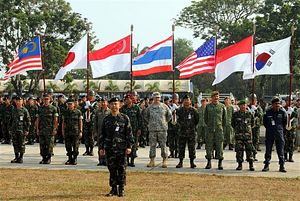Buried beneath the new confusion of what an “America First” foreign policy looks like in the Asia-Pacific, America’s oldest diplomatic partnership in Asia seems to be edging toward Duterte-esque deterioration. Thailand, a treaty ally of the United States and host for the upcoming “Cobra Gold” exercise, was once the model for U.S. engagement in Asia. The two countries have fought shoulder-to-shoulder in every major conflict since World War II, and even redefined their partnership to meet modern global challenges like terrorism and transnational crime.
Yet, since the 2014 military coup, the United States has withheld military aid and high-level engagement, unwilling to resume them until a democratically elected government is restored. As in the Philippines, China has been more than happy to fill this void with their own aid, steadily prying Thailand away from the U.S.-led alliance system. The United States can ill-afford to lose another partner in the region. It is imperative that the United States adopt a more pragmatic approach and prioritize security and economic engagement with Thailand before this alliance, too, begins to fray.
The United States has a chance every year to improve its security relationship with Thailand through Cobra Gold. This exercise, hosted by Thailand, brings together participants from 29 countries who work together in coordinating military, logistical, and humanitarian operations. More importantly, this drill demonstrates the readiness and resolve of the United States to work with its partners in the Asia-Pacific to respond to any disaster, be they natural or manmade. However, U.S. troop participation levels have fallen for three years in a row, numbering 3,500, one-third of its peak of 9,500.
The United States gains little and signals even less through this self-limitation; rather, it risks implying that U.S. commitment to its allies in the Asia-Pacific is conditional. However, there is a welcome change this year with the participation of Admiral Harry B. Harris of the U.S. Pacific Command, the highest ranking U.S. official to participate since the coup. If the United States wants to protect this alliance and posture greater strength in the Asia-Pacific, Harris’ participation must not be a one-off event and the United States must recommit its troop participation levels back to pre-coup levels.
As valuable as a stronger strategic partnership is, deeper economic ties would also stitch the two allies together. Thailand also holds untapped economic potential. Even without a free trade agreement, two-way trade between the United States and Thailand in 2015 totaled more than $37 billion, with U.S. investments in Thailand totaling over$11 billion. Given the demise of the Trans-Pacific Partnership, which Thailand had expressed interest in joining, both sides have the motivation and a starting template to build a quick bilateral trade agreement. This would signal a win-win for both countries: the Donald Trump administration delivers on its promise to increase bilateral deals while the government of Thailand earns greater commitment from the United States to boost its own economy. Thailand is not a charity case; recent military aid provided by China still came with a sticker price of $1 billion. If the United States continues to wait on engaging Thailand, it risks Bangkok becoming more reliant on these alternative regional partners.
Admittedly, the root cause of tension between the two countries, the return of a democratically elected government, remains unresolved. Elections have been promised in 2017, but a history of discouraging delays does not engender confidence in the military junta. However, the current U.S. strategy of punitive disengagement is not working — whatever gaps the United States leaves are quickly and happily filled up by China. The United States must shift its strategy and increase its engagement with Thailand, like the 2015 funding for the anti-trafficking training for 2,640 police, prosecutors, judges, labor inspectors, social workers, and navy personnel, which helped bring Thailand out of its Tier-2 status in the State Departments Human Trafficking Report. Laissez faire diplomacy will not democratize Thailand; rather, it is in America’s interests to engage Thailand to promote responsible governance and rule of law lest Bangkok turn to other, less scrupulous partners.
Thailand is as much an ally to be lost as it is an opportunity to be won. The strategic and human costs of fraying U.S.-Philippine relations have been staggering and there is no clear path to restoring these historic relations in the foreseeable future. Therefore, it is paramount to learn from this mistake and get the U.S.-Thailand relationship right while it still has a chance. Renewed engagement, starting with restoring full participation in Cobra Gold and negotiations for a bilateral trade agreement, will send the right signals and remind the world just how much the United States values its allies and partners around the globe. To do nothing would be to lose America’s oldest friend in the Asia-Pacific.
Anthony Woon Cho is a Researcher at the Center for a New American Security.

































